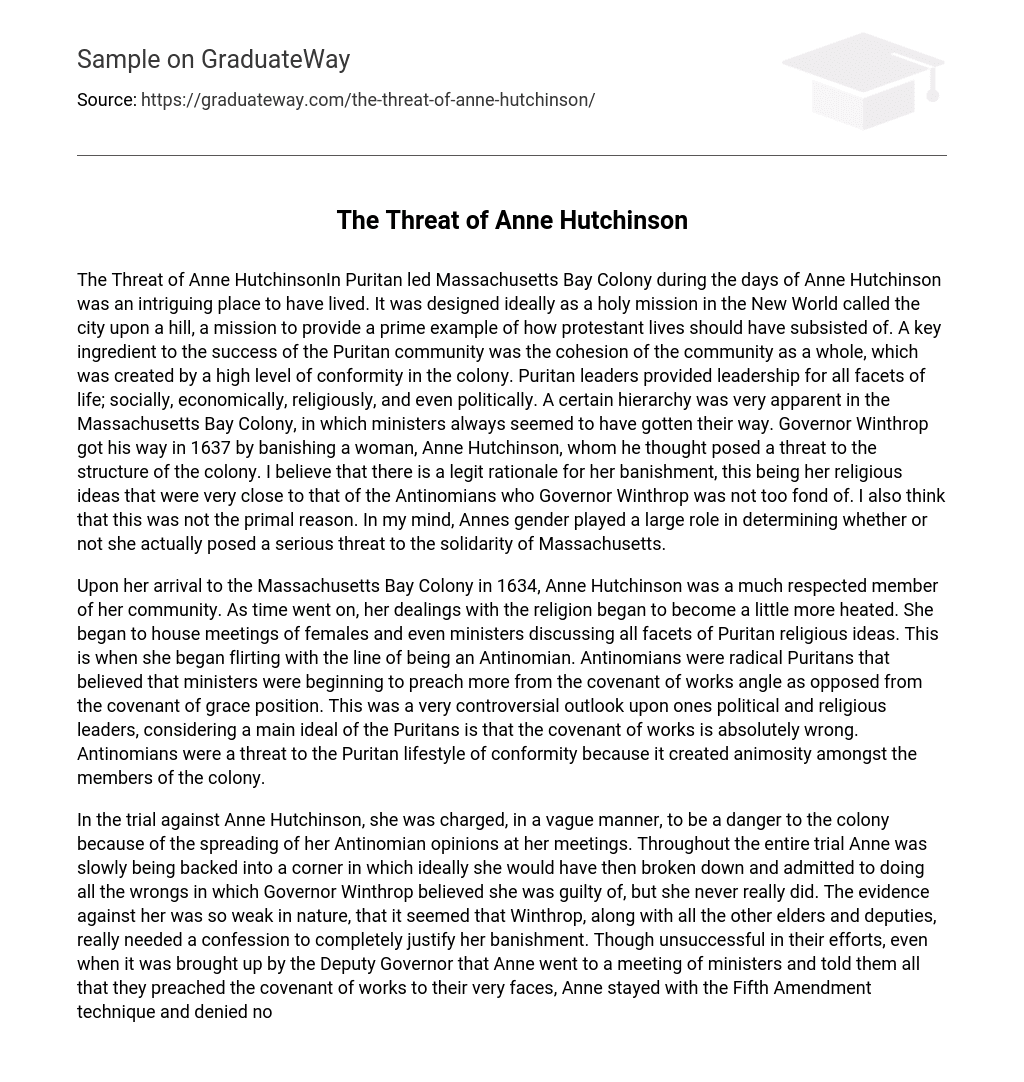In Massachusetts Bay Colony during the time of Anne Hutchinson, a Puritan-led society was established. This society aimed to be a holy mission in the New World, known as the “city upon a hill,” in order to exemplify the Protestant way of life. One crucial factor contributing to the success of the Puritan community was the unity and conformity among its members. The Puritan leaders assumed leadership roles in various aspects of life, including social, economic, religious, and political domains.
In the Massachusetts Bay Colony, a clear hierarchy existed where ministers consistently held the upper hand. In 1637, Governor Winthrop exerted his influence by exiling Anne Hutchinson, a woman he deemed as a potential disruptor to the colony’s system. Although her religious beliefs closely aligned with those of the Antinomians, whom Governor Winthrop disapproved of, her banishment was justified for other reasons as well. Personally, I believe that Anne’s gender played a significant role in assessing the actual threat she posed to the unity of Massachusetts.
Upon arriving at the Massachusetts Bay Colony in 1634, Anne Hutchinson quickly gained respect within her community. However, over time, her involvement in religious matters became more controversial. She started hosting gatherings for women and ministers, where they discussed various aspects of Puritan religious doctrines. It was during this period that she started to tread the line of being an Antinomian.
Antinomians were dissenting Puritans who criticized ministers for emphasizing the covenant of works instead of the covenant of grace. This viewpoint was highly contentious, as it contradicted a core belief of the Puritans that the covenant of works was entirely erroneous. The Antinomians posed a challenge to the Puritan community’s desire for uniformity, causing division and hostility among its members.
During the trial of Anne Hutchinson, she was accused in a vague manner of posing a threat to the colony due to her dissemination of her Antinomian beliefs during her meetings. Throughout the proceedings, Anne found herself increasingly cornered, with Governor Winthrop hoping she would confess to the wrongdoings he believed her guilty of. However, Anne never actually confessed.
The evidence against her was weak, suggesting that Winthrop and the other elders and deputies required a confession to fully justify her banishment. Despite their attempts, including when the Deputy Governor mentioned Anne attending a meeting of ministers and accusing them of preaching the covenant of works directly, Anne maintained her use of the Fifth Amendment technique and neither admitted nor denied anything.
It seems that her mistake was when she claimed that she would have said the same thing about the ministers in private. By saying this, she essentially admitted to having the same beliefs as the Antinomians who were being shunned. This provided enough evidence for the judges and jury to justify her banishment.
In Massachusetts, during a certain time period, it appears that Anne’s mischievous behavior was common. The Puritans convened meetings to address religious matters like translating the Bible and listening to sermons by local ministers. It seems that Anne may have been targeted because of her gender, as women in that era did not have the same freedom they do now. While Puritan women had more rights compared to others around the world, there probably existed some resentment towards a woman like Anne who pushed against societal limits.
Governor Winthrop adhered to a traditional view of women’s roles in society. His wife and sister exemplified this, as they were submissive and supportive rather than assertive. Winthrop, like many other Puritans, believed that women had a specific role to fulfill within the colony. Anne Hutchinson, however, challenged this notion by leading meetings predominantly attended by women. In these gatherings, she taught them how to embody the characteristics of a Puritan woman, which became a distinct role of its own within society.
It appears that Winthrop and other elders in the colony were concerned about the dissemination of Anne’s opinions among women. They feared that this could lead to the emergence of more opinionated women, like Anne herself. The idea of women having power worried Winthrop and the elders, as one can imagine. However, Anne was gaining power and favor.
Taken collectively, Anne Hutchinson posed a genuine threat to the Massachusetts Bay Colony. Not only did she challenge the authority of the colony’s ministers by suggesting that she might subscribe to Antinomian beliefs, but she also caused tension between the sexes. Although the older Puritan leaders may have initially underestimated the extent of Anne’s threat, they likely believed that her influence would grow and generate more controversy, potentially undermining the Puritans’ mission to build a model city on a hill.





